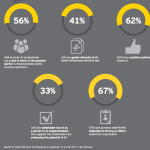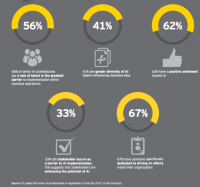These Are The Biggest Skills That New Graduates Lack
Managers and employees don’t always see eye to eye. Fast Company uncovered a wide gap in the way each group thinks about business culture and their radically different ideas about work-life balance.
But there’s another disconnect brewing, and this one is between managers and the newest members of the workforce: college graduates. A new report from PayScale, a provider of on-demand compensation data and software, in partnership with Future Workplace, an executive development firm, reveals that while 87% of recent graduates feel well prepared to hit the ground running after earning their diplomas, only half of hiring managers agree with them.
This isn’t totally surprising, as Fast Company reported that the class of 2016 is overwhelmingly optimistic about their prospects for getting a job within their field of study. Unfortunately, recent studies reveal that underemployment was the reality for more than half (51%) of those who graduated in the past two years.
The report, titled “Leveling Up: How to Win In the Skills Economy,” takes a deep dive into the so-called skills gap and illuminates the skills managers are looking for that many college graduates are either deficient in or don’t have at all. The report also reveals which skills bring in the biggest paychecks and get the employee a promotion. It also found which are the best ones to leave off a resume.
Some of the skills hiring managers find lacking or absent are unexpected. Critical thinking, problem solving, attention to detail, and writing proficiency top the list of skills managers find missing from job seekers’ personal tool kits. On the flip side, managers didn’t find graduates wanting for know-how in search engine optimization marketing, foreign languages, and coding.
The Skills Hiring Managers Found Lacking
Overall, hiring managers found soft skills such as communication, leadership, ownership, and teamwork were missing in this new crop of workers. The following chart shows the percentage of hiring managers who reported the lack of specific skills.
“Graduates need strong communication and problem-solving skills if they want to interview well and succeed in the workplace, because effective writing, speaking, and critical thinking enables you to accomplish business goals and get ahead,” Dan Schawbel, research director at Future Workplace, said in a statement. “No working day will be complete without writing an email or tackling a new challenge, so the sooner you develop these skills, the more employable you will become,” Schawbel adds.
It’s important to note here that age matters in this report. Fifty-five percent of managers who are millennials themselves believed graduates are prepared to enter the workforce versus 47% of gen Xers and 48% of boomers.
Katie Bardaro, vice president of Data Analytics at PayScale, tells Fast Company this may be due to the fact that managers from older generations are likely more versed in these skills and thus have higher expectations for them then managers from younger generations.
Bardaro notes that since this is the first time the study was run, there isn’t any comparison data to previous generations of college graduates. “We can say that the increase in dependence on technology and the recent Great Recession has widened the skills gap,” she says. These two factors have worked together to make employers pickier and make it harder for students and their schools to have the ability to learn and teach new technologies. “It takes time to build a curriculum and obtain an expert who can teach and disseminate that information to students, and the technologies are just changing too rapidly,” Bardaro says.
Bardaro doesn’t think the focus on STEM careers could actually be preventing job seekers from taking the type of coursework that would boost their writing and public speaking skills. Instead, she points to changing technology and its effect on communication. “Younger people defer to a quick text or Snapchat rather than a phone conversation or letter,” she notes.
She also points out that many STEM programs still require a general English course and schoolwork often requires presentations, but there is potentially less education around these skills then there has been in the past.
Most Sought After Skills (And What To Leave Off Your Resume)
The skills that are getting workers the biggest pay bumps are emerging in the STEM field. Overall, the programming language Scala is the skill that will get you the biggest pay boost (a 22.2% increase in earnings), followed by Cisco UCCE/IPCC (enterprise communications software) at 21.1%, and Go programming language at 20%. This makes sense, as technology jobs are in the greatest demand and command some of the highest salaries across industries.
But the most common skills held by workers at the executive level are also hard skills such as business and IT management. At the director level, donor relations is most common, but software development and senior financial management come in second and third.
As for what is best left off the resume, the report reveals that “foundational skills” should get the heave-ho. Those are the ones most frequently cited as skills by employees within each industry represented. For example, a job seeker looking for employment in tech shouldn’t list their experience in data entry, WordPress, or even system repair. The reason, the report notes, is that placing these among the top skills on a resume could translate to placement in a much lower-level job, earning significantly less than a peer with more high-level skills.
Two words to leave off your resume
Fast Company , Read Full Story
(69)















